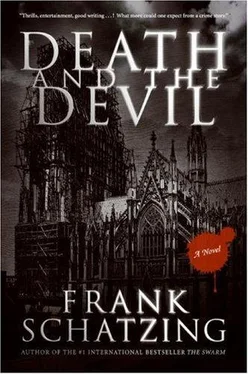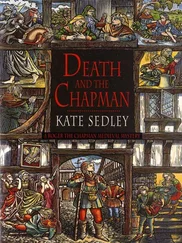Jaspar licked his lips and had a drink.
“In addition to which,” he went on, “Alexios had problems with Rome. The excommunication had been passed on to him like foot-and-mouth disease. No hope of help from the West. So Alexios tackled the Seljuks, Pechenegs, and what have you on his own, drove them back and managed to negotiate a peace, a pretty flimsy affair, but still. For the benefit of Christendom, he announced, though basically all he was interested in was regaining his territory. He couldn’t have cared less about the fact that the holy places—Palestine, the Holy Sepulcher, Jerusalem, Antioch, where St. Peter had lived—were under Seljuk rule, which was what the pope was so concerned about. All the horror stories about the ungodly Turks who slaughtered Christian pilgrims by the thousand, cooked and ate them, were products of the overheated imagination of deranged hermits. The Christians in the occupied territories had the advantage of Islamic law, the most tolerant there is, if you ask me. They were allowed to practice their religion and had very few complaints, certainly not enough to send a call for help to the West. Is this all beyond you, or would you like to hear the rest?”
“Of course. Go on.”
Jaspar smiled. “You’re not so muddleheaded as that mat of red hair would suggest. Right then. Back in Rome things were improving. Both the pope and the antipope died and a new one was elected. He called himself Urban II and if I said before he was a blockhead, that was only half the story. He certainly wasn’t stupid, but his indolence was nothing short of blasphemous. He simply had no desire to quarrel with anyone at all. The first thing he did was to lift the excommunication from Alexios, fighting with his back to the wall in far-off Byzantium, and conclude a treaty of friendship with him. Two crooks who deserved each other, ha! Alexios immediately tried to think up ways of winkling a few pious warriors out of his new friend, to help him win back some of the occupied territory, Anatolia in particular. But there were limits to this friendship, since Urban just wasn’t interested in war. He ran his church and that was that. Alexios was unhappy with that. What was the point of an ally who did nothing? So he sent an embassy of twelve ambassadors to Piacenza, where Urban was holding a council, and they went on at great length about the sufferings of the Christians under the yoke of Islam, wailed and gnashed their teeth at the siege of the Holy City, and made a great to-do about pilgrims on their way to Palestine being hung by the feet and chopped into little pieces while still alive and God knows what other nonsense. All hugely exaggerated and full of oriental rhetoric, which they learned down there. But effective. Urban promised help. Promising was one thing Urban was good at.”
“And? Did he send help?”
“Urban? Not straightaway.” Jaspar giggled. “As I said, he was a cleric through and through, and preferred to spend his time in the usual ecclesiastical pursuits. Canonizations, witch trials, that kind of thing. But at least he’d promised. Alexios was rubbing his hands at the prospect of a hundred well-armed knights, and Urban would certainly have sent them, sooner or later—if he hadn’t had that blasted dream.”
Jacob, who was listening fascinated, went to fill his mug, but there was nothing to fill it with.
“Oh,” said Jaspar and teetered off toward the back of the room.
“I’m not bothered,” Jacob called out after him.
“But I am.”
“You can’t just stop like that.”
“Why not?” Jaspar’s voice was already coming from outside. “The story took hundreds of years to become history, but you can’t wait.”
“I want to know what happened next. And you still haven’t told me about the lost children.”
Jaspar was trying to open the trapdoor in the yard. “Well, if you insist, come out here.”
Jacob jumped up and went out into the dark yard. Jaspar had lit a candle and indicated he should go down first. Cautiously they negotiated the slippery steps. Jacob was plunged into the damp, musty smell once more and a strange feeling of timelessness came over him. The darkness in front echoed with the drip of water. Then candlelight filled the immediate surroundings. Jaspar was standing beside him.
“Could you imagine spending the rest of your life here?” he asked. “Not out of choice, but if you had to?”
“Not even by choice.”
Jaspar gave a dry laugh. “And yet this is paradise. What do we know about the Crusades anyway?” He went over to a barrel and drew off two or three pints. As he followed him, Jacob seemed to be floating. He wasn’t used to the stuff. He spun around, arms outstretched, and felt himself sink to the ground like a feather.
Jaspar gave him a searching look and placed the candle on the ground in front of him. Then he sat down opposite and filled the mugs. “This is a better place to talk about the Crusades,” he said, taking a draught.
Jacob followed suit. “Agreed.”
“No, you misunderstand. This cellar is a hole in the ground. It’s unhealthy and oppressive. It’s my penitential chamber.”
“Nice penance.” Jacob grinned.
“I could just as easily drink up there, in the warm. But that’s what I don’t do. To sit in a cozy, well-heated room talking about injustice and suffering seems to me tantamount to mocking those who really suffer. You want to know what Urban dreamed? He claimed the Lord appeared to him and commanded him to take up arms in the name of the Cross against the heathen and unbelievers. In November of the year of our Lord 1095 he preached the Crusade at the Council of Clermont, beseeching rich and poor to wipe out the Turks in a massive campaign, a holy, just war the like of which had never been seen. And everyone who was there—and there were lots, too many—burghers, merchants, clerics, and soldiers, tore their clothes into crosses, screaming Deus lo volt! Deus lo volt!
He was silent for a while. Jacob didn’t ask what the war-cry meant. He could guess.
“So off they went, kings and princes, knights and squires, thieves and beggars, priests and bishops, the riffraff from the streets, swindlers, murderers, anyone who could ride or walk. They set off rejoicing to fight for the Lord, bribed by the unparalleled remission of their sins, if only they would take up the sword and journey to the Holy Land. And they kept on crying Deus lo volt! , as if God could have wanted them to massacre the unbelievers in their own land, steeping their hands in the blood of the Jews of Mainz, Worms, Speyer, and other cities, to indulge in mindless, wholesale slaughter, beheading, burning, disemboweling innocent men, women, and children, laying waste to the countryside, plundering, the scourge of even the Christians they claimed to be going to liberate.”
Jaspar spat on the ground. “God willed that? The stories your Bram told about the Crusades were a load of crap. I heard them and nothing could be further from the truth, even if he did put it over well. Bram was no crusader. He’d got to know a few of those who came back with no arms, no legs, or no wits left. Hungary and Byzantium, Istria and Constantinople, everything was razed to the ground. I read what a chronicler from Mainz wrote, before they butchered him, too: Why did the sky not go black? Why did the stars not extinguish their light? And the sun and the moon, why did they not go dark in the vault of heaven when, on one day, eleven hundred holy people were murdered and slaughtered, so many infants and children who had not yet sinned, so many poor, innocent souls? They beseeched the Almighty to help them, but the Almighty happened to be somewhere else, or perhaps He thought they deserved it. And all that happened while they were still here, in our towns and cities.”
Читать дальше












